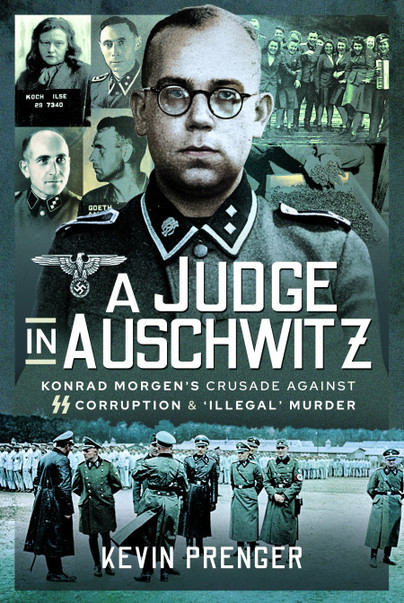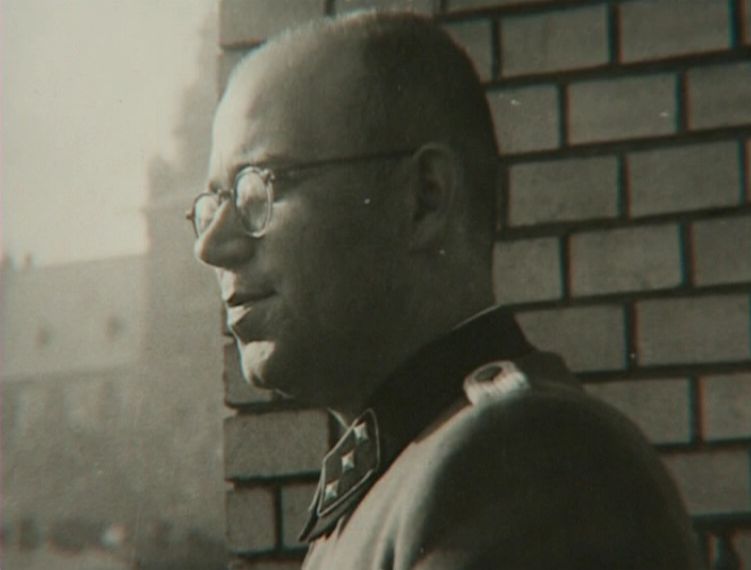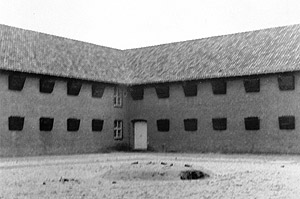| Title: | A Judge in Auschwitz - Konrad Morgen's Crusade Against SS Corruption & 'Illegal' Murder |
| Writer: | Prenger, K. |
| Published: | Pen & Sword Books |
| Published in: | 2021 |
| Pages: | 176 |
| Language: | English |
| ISBN: | 9781399018760 |
| Description: | In the fall of 1943, SS judge Konrad Morgen pays a visit to Auschwitz concentration camp. The reason is a parcel containing chunks of gold, sent from the camp and intercepted by customs. In the camp he discovers that this smuggling is the tip of an iceberg: camp guards in their masses are guilty of theft and corruption. And that is not everything yet because Morgen also finds out that members of the staff are murdering inmates without official approval. Within the Third Reich and within the concentration camp system a delegated monopoly on violence existed. This monopoly and the command structure that went with it, had led to every subordinate being able to transfer his own responsibility to the next higher rank. This went all the way to the top, for many to the Führer himself. In this manner anyone could hide behind 'Befehl ist Befehl' This delegated monopoly meant that during the Holocaust, systematic robbing, exploiting (slavery) and murder of predominantly Jews was ordered from the top down. Members of the SS in concentration camps assisted within these frames in the assembly line extermination of Jews. So, within these frames, cases we would today consider punishable and criminal, were entirely legal.On arrival in the camp, the prisoners were to relinquish all jewelry, money and goods. These were painstakingly selected, classified and registered. In theory, that is. The reality was very different though and corruption and self-enrichment were the order of the day on all levels. Konrad Morgen (1902-1982) and his team were ordered to conduct an investigation into this corruption and take steps against it. Morgen already had a long career as judge and soldier (in the 5. SS-Panzer-Division Wiking) under his belt when he was appointed in 1943 to investigate corruption in concentration camps. Corruption didn't only mean illegal appropriation of goods but also the 'unapproved torture and killing' of people. The first major case in this period was against the commander of Buchenwald, Karl Koch. After having read this book about the history of the career of Konrad Morgen, the reader will usually be left with mixed feelings. Was Morgen a cunning opportunist who cleared his own doorstep after the war or, even stronger, claimed to be a resistance warrior fighting the Holocaust? Was he a naïve, although ambitious technocrat who fought evil within the limitations of existing legislation? In any case, it becomes clear from Prenger's book that his role was of a schizophrenic, paradisal character. On the one hand he indicated that by charging executives on the camp staff he wanted to thwart the extermination process; on the other hand he played down the seriousness of the crimes in the concentration camps during trials against henchmen of the camps after the war. With this book, 'A Judge in Auschwitz', Kevin Prenger (1980), author of for instance 'War Zone Zoo' and 'Christmas under Fire', has produced an intriguing document again. To the reader he portrays the various aspects and angles of Morgen's career. Eventually he attempts to draw conclusions here and there but the reader is also being given room to make his own judgement. Whatever it is, this book should not be lacking on the book shelf of fans of documentation about the Nazis and the Holocaust. |
| Rating: |      Excellent Excellent |
Information
- Translated by:
- Arnold Palthe
- Article by:
- John Smeets
- Published on:
- 24-10-2021
- Last edit on:
- 19-07-2022
- Feedback?
- Send it!
Images
Related news
Illegal murders in Auschwitz
WWII specialist Kevin Prenger wrote: 'A Judge in Auschwitz' about SS judge Konrad Morgen. In 1943, this judge paid a visit to concentration camp Auschwitz in order to investigate malpractices in the camp – as strange as it may sound. The occasion was a parcel, sent from the camp and containing chunks of gold and which was intercepted by customs. In the camp, Morgen discovered this smuggling affair was the tip of an iceberg: camp guards in their masses were guilty of theft and corruption. Whereas in the gas chambers of Nazi-Germany millions of Jews are being killed, Morgen is engaged in gathering evidence of 'illegal' murders. The Dutch History website Historiek.net questioned author Kevin Prenger about his remarkable book.
New book about SS Judge Konrad Morgen published
In October 2021 Pen & Sword Books published a book written by TracesOfWar volunteer Kevin Prenger. It is titled A Judge in Auschwitz and tells about Konrad Morgen's crusade against SS corruption & 'illegal' murder in the concentration camps. It has already been published successfully in Dutch and Polish. This English version was translated by Arnold W. Palthe, also a contributor of this website.







